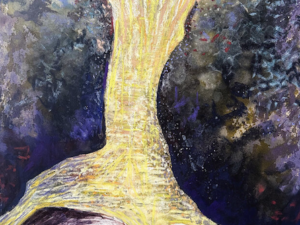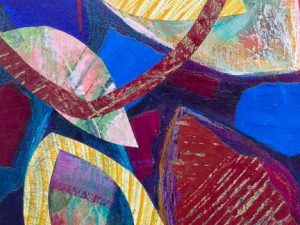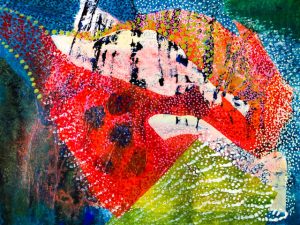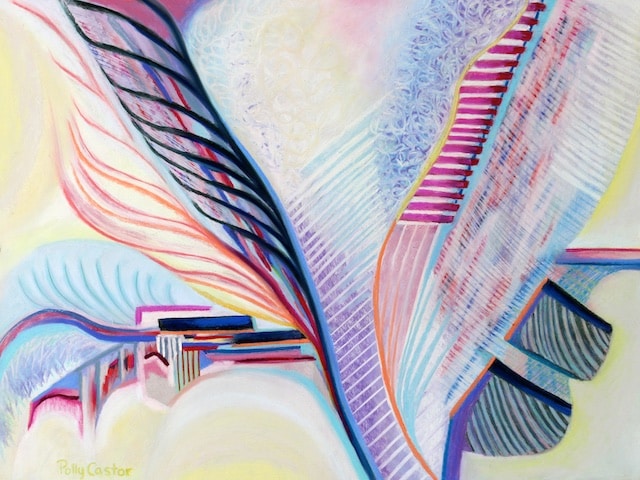
Overcoming White Supremacy (pastel) by Polly Castor
Promising myself not to become self-conscious while writing my “morning pages” every morning, I thought that once in a while, I’d pick out an entry to share with you. I quote all sorts of other people, so why not myself? So here we go, this was yesterday’s entry:
“Last night I reached out to a black friend to send an extra hug, and to see how she was feeling with all the attention on racism in the last few days, since I know that she and others like her live with it all the time. I met her last June at the international pastel convention, when I was taking photographs of the scene for my blog. She and her husband were the only blacks there in a sea of white faces. They were sitting by themselves, looking on, as a buzz of cheery activity went on around them.
I had just read the book Small Great Things, an excruciating book about white supremacy, so I was feeling extra sensitized to this, although the issues of racism have been important to me since high school, when I senselessly wasn’t allowed to date a terrific black guy I really liked. So I stopped what I was doing, and plunked myself down next to them, with the clumsy opener that I couldn’t imagine what it must be like to be the only black people there. Not surprisingly, they appreciated my candor and sensitivity, and we chatted, sharing our art and contact info, and moved off the race topic into being normal equals.
I reached out to her because I feel it is important to listen to those affected, to share their pain in order to alleviate it somewhat. There are other black people in my life I should reach out to too, but I thought of her because of the frank conditions that precipitated our meeting. As white people, I feel we are all complicit and vaguely unwitting beneficiaries of a system that is colossally, horribly unfair. It will take all of us universally to undo 400 years of damage, hate, and hurt.
It is not enough to post something condemning racism, and then get back to our comfortable little lives. It is not enough to send money to some anti-racism organization and wash our hands. We must have black people in our communities, on our reading lists, in our book clubs, at our weddings and dinner tables, in our cars and in our churches. We must integrate them into our lives as the wonderful, talented, passionate equals that they are.
I live in a fairly all-white area of Connecticut. My kids grew up there without a racist bone in their bodies, but how many black friends do they have? Over 90% of my friends on Facebook are white. This is not how I want it to be, but has happened by default. We have to make more of an effort to befriend people not like us– of every stripe, not just racially. It is clear to me when we walk enough in someone else’s moccasins, that compassion and understanding become easy and straightforward. We can’t do that if we haven’t reached out to know them as people, beyond appearances.
My friend shared that she has a handsome, intelligent son, and two precious grandsons; she articulated that she “lives in terror” for them everyday. Her brother had been beaten up and bloodied by police officers, while walking to this mother’s house to fix an appliance, “just because they could.” She shared how a black man does the same crime as a white man, and the black man gets 16 years in prison, while the white man gets 6 months probation. These things are not isolated occurrences but happen everyday, and we do nothing. We don’t even notice. I know I don’t live in terror for my son walking down the street being jumped for no reason by the police.
I saw a short clip yesterday where a white woman asked a white audience, “If you want to be treated the way we treat black people, stand up.” She asks it twice, and each time, no one in the audience stands up. “That means,” she says, “that you know black people are not being treated properly. What are you doing about it?”
The conversation with my friend revealed her own understanding of what the inherent problem is. During some legal thing in the news involving a black, the judge, as an exception, gave an lighter sentence than he might have for a black, since he saw this black man’s life as “worthwhile.” My friend said that was when she realized that, in general, people simply don’t think that black people are worthwhile. It was heartbreaking to hear her share this understanding, which felt to her like a deep truth.
I feel that all are created to be explicitly equal, literally, without exception. All of God’s children are vastly worthwhile. As uncomfortable as it is, that includes every fearful, hateful, self-justifying white too. Spiritually, I know that all of us have the complete set of Godlike qualities and attributes. We have to proactively live them and consistently witness them in others. We need to bring them out in both ourselves and in others.
The white supremacists, are acting out in pain and confusion, ignorance and fear, not just superiority. They need healing as much as the downtrodden, abused blacks do. I feel a need to champion everyone’s worthiness and offer empathy everywhere. Only as all of us do this in our daily prayers and actions for everyone, does this change. No one can be left out of God’s worthiness and circle of inclusive love. This comprehensive embrace of one Love, one Life, together in peace and joyful community, is what I’m bucking for. I’ll be satisfied with nothing less.
Clearly to me, love is the answer to both black and white parts of this equation. Forgiveness is also key. Love doesn’t happen without opening to it. Both sides can find the courage and faith to let go of longstanding limiting beliefs. How can either side expect it to be different? By being willing to be vulnerable, which frankly needs to start with us whites.
We need to own that life is better with more variety and color in it. We need to go the extra mile repeatedly, habitually. We need to own that collectively, if not personally, we’ve been the problem for so long. We need to correct our preconceptions, and challenge our stereotypes. We need to feel sorry, say we are sorry, and then insist on doing differently, in whatever way is available to us in our own sphere of influence. Refuse to let excuses of not knowing how or what to do, or where to start, hamper you from doing it.
I keep thinking over and over again, that God has no skin color. God’s qualities and attributes are non-material ideas, and we all have all of them by reflection. But no skin, ethnicity, cultural differences, myopias or wrongs are involved. God created and upholds everyone equally. Ultimately, skin color is so incredibly irrelevant to our identity, it is amazing to me we are not more enlightened to this fact. But we need to be. Loud and clear.
We need to realize– i.e. make it real, align with it, and live out from it– that skin color is entirely irrelevant to anyone’s essential being. Let’s put both spiritual truth and our highest ideals into practice, in every way, but without omitting this issue of complete equality. Our worthiness, spiritually, has always been intact, and each of us needs to live our highest self from that place as loving brothers, sisters, and good neighbors.”
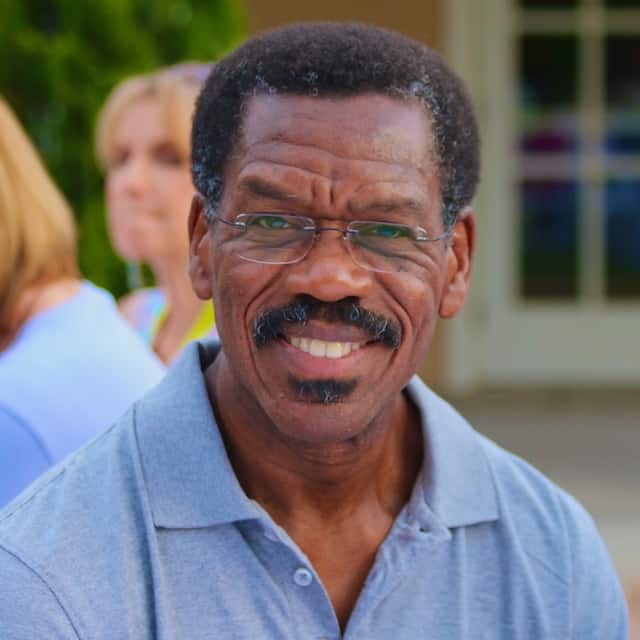
4 Comments
-
Fine writing in behalf of equality for all.
Thank you, as always.
We’ll eventually get out of the ignorance that keeps us bound to limitations in all areas of thought and life.
The sooner the better!Sue
-
I have lived my life in a bubble of whiteness–no black friends or even acquaintances until fairly recently. However, my mother taught her son and daughter to love everyone. She lived her understanding that all were worthy of love and appreciation as God’s children. So I grew up feeling strongly about the value of all mankind. But, home, church, school, community were all white. I related to what you said above: “I feel we are all complicit and vaguely unwitting beneficiaries of a system that is colossally, horribly unfair. It will take all of us universally to undo 400 years of damage, hate, and hurt.”
Two years ago when a friend I met at our Interfaith Alliance, invited me to meetings at her house in support of racial diversity and understanding, I was so ready. I was very concerned about racial prejudice in the United States. My friend invited black and white friends to have conversations with one another about race.
Our first meetings were getting to know each other and watching the video series: The African Americans: Many Rivers to Cross with Henry Louis Gates, Jr. This series consists of six videos. We committed ourselves to view one video together each Sunday afternoon and have a conversation about what we learned and how it made us feel. After the videos we continued our race conversations. We read books together that sparked our conversations. For a year we met every Sunday afternoon for discussions. We also attended a few events together featuring black speakers.
This experience has helped me reach out more to African-Americans and to be a friend. It has helped me stand up for black people when I hear slurs or jokes that are obviously biased and unkind. It encouraged me to take part in diversity discussions when I was invited to attend meetings at our local university. I am more aware of looking for opportunities to make a difference and help change this culture of prejudice.
I share this experience to show what even one person can do, as my friend did, to help educate others to a larger purpose and action.
-
Author
That’s wonderful. So glad you both did and shared that! Xx
-
-
I love this painting but when I look at it I think of angels and purity and light! But a great thing to paint or draw about!
